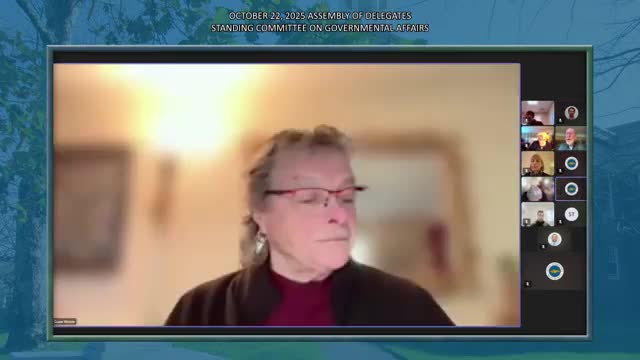Committee debates clerk job-description ordinance after unsolicited legal opinion
Get AI-powered insights, summaries, and transcripts
Subscribe
Summary
Members of the Cape Cod Regional Government Assembly of Delegates' standing committee on government affairs and rules spent much of their Oct. 22 meeting debating proposed Ordinance 2025-12, which would amend the clerk of the assembly's job description and clarify hiring and firing procedures.
Members of the Cape Cod Regional Government Assembly of Delegates' standing committee on government affairs and rules spent much of their Oct. 22 meeting debating proposed Ordinance 2025-12, which would change the clerk of the assembly's job description and clarify how hiring, supervision, evaluation and termination are handled.
The discussion focused less on the ordinance's text than on a legal opinion the county administration obtained and shared with delegates. Several members said the opinion raised hypothetical problems but did not find that the assembly had acted improperly.
"I'm not a lawyer and I don't even play 1 on television," Delegate Oman said, summarizing his view that the assembly followed the correct procedures and that the legal memo raised unlikely "hidden traps." Delegate Killian, a co-sponsor, said the intent of the ordinance was to make the clerk's relationship with the full assembly more collaborative rather than vesting sole authority in the speaker.
Deputy Speaker Gessen outlined four concerns flagged in the counsel's letter, including a scenario in which a majority of delegates could terminate the clerk contrary to the speaker's wishes, potential Open Meeting Law implications and the absence of a defined process for showing cause. Gessen proposed a redraft requiring the speaker to initiate any termination and then secure support from a majority of delegates as a way to address the counsel's points.
Other delegates raised related issues. Delegate Harder argued the outside counsel appeared unfamiliar with how the assembly's clerk functions as a shared staff resource for delegates. Delegate O'Malley and others suggested that human-resources review and the use of executive sessions could address personnel and privacy concerns. Several delegates questioned who requested the legal opinion and whether the cost was charged to county funds; Delegate Green asked if this would become routine.
Clerk Kirk Fletcher told the committee the ordinance had been publicly noticed and that a hearing is scheduled for Nov. 5 in the Cape Cod Times. Committee members generally agreed there was no rush to finalize language and that sponsors should use the two-week window to consider clarifying edits.
The committee did not adopt the ordinance or take a formal vote to change it at this meeting. Delegates suggested next steps that include: (1) the ordinance sponsors drafting revised language to address the counsel's concerns (for example, making the speaker the initiator of termination proceedings and specifying procedures), (2) leadership asking the county administrator for the origin and purpose of the legal opinion and whether this will be routine practice, and (3) consulting with county HR or counsel about confidentiality and Open Meeting Law limits before bringing amended language to the full assembly.
The committee's discussion repeatedly distinguished among items that would be discussion-only, potential directions to leadership or staff, and formal actions: the only formal action recorded in committee on this item was the scheduling of the public hearing on Nov. 5; no ordinance vote occurred.
Supporters and skeptics both emphasized restraint. "We have time on our hands now. Let's do it deliberately," Delegate Oman said, arguing the assembly should take a measured approach given recent leadership changes.
Next steps recorded in committee minutes and by members during the meeting: sponsors (Delegates Killian and Oman) will consider redrafting the ordinance to address the counsel's identified risks; the speaker and committee leadership will ask the county administrator in writing why the opinion was sought and whether it will be the standard procedure going forward; and the ordinance will proceed to the full assembly public hearing on Nov. 5 as noticed.
Ending: The committee left the item open for revision and public comment rather than making an immediate decision. If sponsors submit revised language, the matter will return to the assembly for public hearing and possible action after members have had time to review the counsel's origin and the proposed edits.
